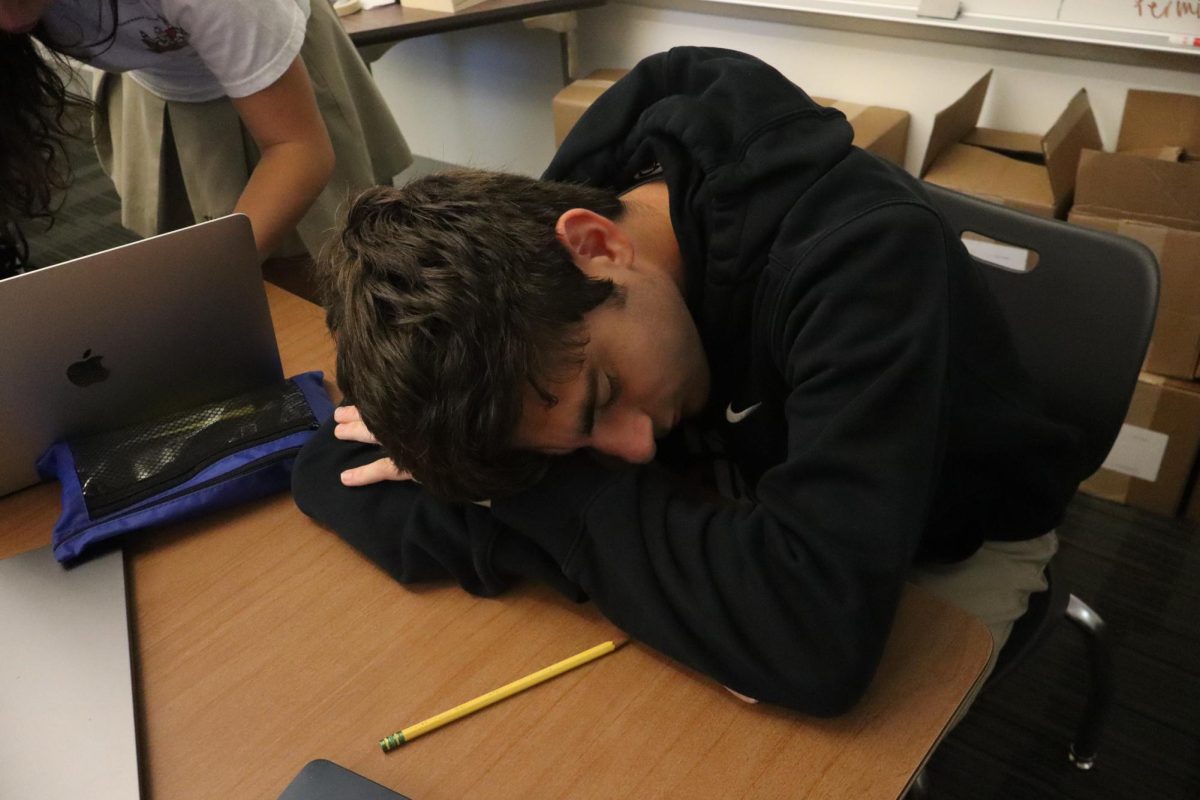By Akiva Bryant
An upcoming test or quiz that we may not have had enough time to study for, friendship issues that take more of a toll than we want, juggling school with friends, family, sports, arts, jobs, etc. — stress is a normal part of life. But like anything, too much of it is dangerous. Sometimes when emphasis is placed on giving your all, your all doesn’t feel like enough. And high school students especially tend to get worked up over their efforts and allow all that pent up tension to boil over.
Ms. Elizabeth Carter, counselor for the Class of ‘26, certainly notices students’ stress. A lot of juniors come into her office worried about their future and college admissions. However, this constant worrying about the future has little benefit and can hurt those who partake in it.
“I think y’all are so focused on the future,” Ms. Carter said. “‘What if? What if? What if?’ You’re missing some really great moments here in the present. And that stinks for y’all, you’re missing some really great fun parts about high school because you’re worried ‘what if I don’t get into college?’ Everyone’s getting into college. Yeah, I can promise you that. And if you were here in the present moment, I think you’d be able to see and be able to handle and deal with what’s happening now, rather than focusing on the future.”
Every problem in your life can be a factor of stress. Whether it’s school, work, family or friends, these conflicts, if not dealt with, can build up.
“When you aren’t talking through or dealing with each issue as they come, it’s just this big mound,” Ms. Carter said. “So whether it’s a family issue at home, that’s going to come into your math test, we all have vulnerabilities. We all have things that keep us from being 100%, and when those start adding up because you’re not taking care of it, or dealing with it or looking at it, it’s a lot of avoidance. That’s what… keeps that stress really high.”
There’s a biological reason behind stress that dates back to primordial times, back when humans daily feared for their lives.
“So like [the part of our brain where emotions are held], it’s the only part of our brain that has not developed like the rest of our brains,” Ms. Carter said. “And so when we feel stress, it can also signal… if I don’t do this, I will die. And so sometimes we take our emotions as facts, and the stress as facts, rather than, like, a mere suggestion… and so it can be detrimental.”
Stress that is unresolved and sits in your body can actually be quite toxic for you. Not addressing the problems in your life can lead to numerous health issues.
“So when your body receives, like, a stress signal, it signals for the hormone adrenaline to go into your muscles and that’s what gives you… that movement, like the fight or the flight kind of thing,” Ms. Carter said. “And yet, if you don’t do it, if you don’t move, then that adrenaline just sits in your muscles and it becomes toxic too much. And so it can cause heart disease. You know, because your heart’s muscle, it can, like, lead to really poor health. And so starting off as a kid and a teen, not handling and working through your stress, can lead to some really poor… health problems later on in life.”
The stress craze can run high, especially during exam season. When students are hyperfixated on their grades and how to keep them afloat, they fail to realize how much their constant worrying can impact them. But Ms. Carter hears students out during exhausting times.
“We’re asking you to remember things that you started doing in August and to keep adding on top of that,” Ms. Carter said. “And that’s hard. That is really hard… Students take it as like, ‘I need to memorize this for the number, and so it is a lot of stress, especially for y’all juniors, because what I hear often is, this is the last opportunity for grades on a transcript before college.’ Like, junior year is the most important year, and so I am hearing a lot of stress around finals and exams because, you know, ‘I have to do this to get into college. It has to be a good grade.’”
This sentiment is especially expressed among students. Exam season is notorious for students, staying up past midnight, studying for hours on end and worrying about their grades. Students such as Jaia Williams ‘26 already feel the pressure.
“Exam season is always really stressful because, like, I have to…just think about what I need, like, to keep my grade or to bring it up,” Jaia said. “So I have to… strive for that grade. And I feel, like, a lot of pressure. And same with exam season…you can’t fail your exam. So that’s a lot of pressure. And…I have a lot of, like, extracurriculars to do, so I have to sit there and…study, sit there and study every day, but I can’t even study every day because I’m so — yeah, I’m a little stressed.”
So what should students do when the schoolwork just becomes too much? Well, that’s what school counselors are for! Throughout the year, counselors host events such as the Stress Less Room and next semester’s My Mind Matters (M3).
“Talk about it,” Ms. Carter said. “Come talk to me. Come talk to the other school counselors about ‘what skills can I use to get through this stressful moment,’ not to get over it. You have to see them. You have to recognize them. You have to use skills rather than avoiding and letting it pile up with other things you’re also avoiding.”






























